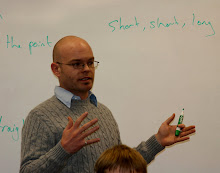Sean Campbell
clearprose@gmail.com 9/16/07
"Listen to the Natives" Mark Pensky
Pensky writes his article under the premise that the gap between students and teachers has widened beyond the expected generational gaps traditionally accepted. In fact, the gap, presently, excludes education during the day as most students feel their "real" education begins on their own, with their technology tools. Once teachers accept that students are participating in a different language than the majority of teachers, teachers can begin to make progress. Additionally, if teachers, and schools for that matter, do not make changes for the 21st Century than "we will be left in the 21st Century with school buildings to administer--but with students who are physically or mentally somewhere else." Pensky identifies a number of considerations to reach and teach our 21st Century students.
- Value engagement before content: engage through gameplay.
- Utilize student knowledge and skill to teach teachers and other students.
- "We can no longer decide for our students; we must decide with them": encourage collaborative decision making regarding design instruction.
- Provide flexible organization of classrooms: personalized instruction and self-selecting learning groups.
- Utilize their digital tools for instruction and evaluation. Everyone else (globally) is doing it!
- Prepare by maximizing programing abilities.
- Eliminate "legacy learning" entirely or join with "future learning."
- Incorporate students' after school penchant for learning into our school days by utilizing their technology.
- Acknowledge and listen to our students' voices or risk further disenfranchisement.
Pensky offers a fascinating perspective on education that in many ways acknowledges commonly held educational principles that are unfortunately oftentimes neglected. Namely, honoring and listening to students' voices, making the material relevant to students' lives, and allowing students to participate in their education. The disconnect between students and teachers has existed throughout the ages, but technology's rapidly changing face exacerbates this divide. Besides already understanding the aforementioned premises, I thought Pensky raised some interesting propositions, particularly using cell phones in classrooms as a teaching tool. His flexible organization would absolutely shock the public education institution and society in general because it would nullify one of the central uses of these institutions: housing students while their parents work. Additionally, his propositions discredit teachers as guides, imparters of knowledge and wisdom. It is misguided to place all expertise and control in the hands of children and adolescents. Collaboration with, listening to, and connecting to students is essential regardless of the content or method, but not acknowledging the influence and need for adults as guides in the lives of children seems just as misguided as remaining in the dark ages of educational pedagogy.

